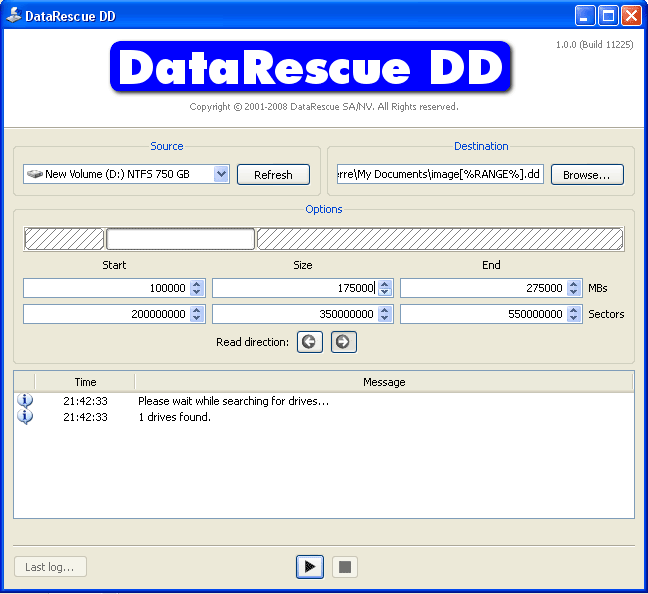DrDD- DataRescue's DD freeware
DataRescue's DD (in short DrDD) - is a graphical disk imager intended for data recovery and backup of partially corrupted storage devices. DrDD creates complete or partial images of disks or memory cards to files on another storage device, allowing multiple data recovery attempts on the raw data, thereby minimizing the risk of damaging the corrupted media further. DrDD is available for Windows PC and Mac OS X machines.

Source: this is the damaged storage device you want to recover from, in this case, as 750 GB NTFS drive.
Destination: this is the file where data read off the media will be stored. Since DrDD can backup partial areas, the default naming scheme will include, as a reminder, range information. Two formats are supported: one pure raw format, created with the .dd extension, and a PhotoRescue specific format, created with the .cib extension.
Range Selection: there are two ways to select the portion of the damaged media that DrDD will attempt to read: by size, or by allocation units (commonly referred to as sectors). In this case, we are attempting to read 175.000 MBs starting at 100.000 MBs and ending at 275.000 MBs. The default selection is to backup the whole device. Coarse interval selection is achieved through the MBs interval boxes. Fine grained interval selection is achived through the Sectors interval boxes. This feature would typically be used with a hard drive that suffers from bad sectors or a memory card that locks up because if a defective memory bank.
Read Direction: the creation of the copy can be done by reading the device forward or backward. The default copy direction is forward. Copying backward may be interesting because, in some cases - typically hard drives - it disables the look ahead buffer and therefore reduces the risk of lock up on a full track.
Log Window: will display messages about the program's operation.
Last Log: this button will call up the last log. Since a hardware crash may completely lock a system, it may be difficult to determine exactly where the damaged area begins. If a lock up occurs, the system should be reset, and the log viewed to determine the last safe sector to read.
A typical use example
A 40GB hard drive suffers of physically bad sectors in the system area that cause the drive to lock up when the damaged area is hit by a conventional disk duplication program or a data recovery program. DrDD is first used to attempt an image of the drive. DrDD locks up as well, the error is completely irrecoverable. The system is reset. Through the last log, the problematic area seems to be sector 1.000.000. DrDD is used to first create an image of the hard drive up to sector 999.999. Knowing that hardware errors are often contiguous, a second image is created, backwards, from the end of the drive (for example 40000MBs) back to sector 1.000.001. The backward copy proceeds and finally locks up at sector 1.004.000. If the data hasn't been saved, a new forward copy starting at sector 1.004.001 and going up to the end of the drive is done. The user now has saved most of the raw content of its hard drive and has saved the multiple trial and error read attempts he would have gone through if he had restarted the copy forward at sector 1.000.001 - with most of the data in a safe place, the user is now able to try as many data-recovery utilities as he wishes, for example our own PhotoRescue application.
Important Notes
DrDD is freeware.
If you are not a PhotoRescue customer, DrDD is strictly unsupported. We will do our best to fix reported bugs but reserve the right to ignore support requests coming from non customers.
Data Recovery can be very tricky. In some cases, merely reading a hard drive or a memory card "just one more time" may completely crash the device, for example because it overheats or debris are dragged around by the hard drive heads. The purpose of DrDD is to minimize that number of reads and to allow safe recovery attempts from image files, but DrDD is not immune to the crash risk. Unless you specifically coerce DrDD into writing something to a damaged device, it will NOT change the data being imaged.
If you are uncomfortable with the notion of disk images, please DO NOT use DrDD. Thanks.
Download
 |
 |


